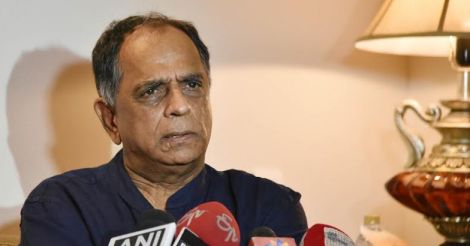Mumbai: While there has been an intellectual uproar over the cuts ordered by the Central Board Of Film Certification (CBFC) in Suman Ghosh's documentary "The Argumentative Indian", CBFC chairperson Pahlaj Nihalani speaking on the cuts argues that the mere deletion or beeping of six words is no reason to feel creatively smothered when those words indicate a clear contempt for Indian culture and democracy.
"I've been flooded with calls from print and television channels asking why we've beeped six words in the documentary. For the first and last time, here's the reason why. Because we felt a documentary on an Indian Nobel laureate referring so insensitively to our politics and religion could result in a serious breach in the peace and harmony of the country. At one point, professor Sen talks of Indian democracy and refers to Gujarat's 'criminalities'. We've asked for 'Gujarat' to be removed," said Nihalani.
Read: Pinarayi slams CBFC over Amartya documentary
"At another point in the documentary there is a reference to the enemy in India being religious leadership. We've asked for ‘India' to be removed here. The third word we've ordered cut is when Professor Sen speaks of India being interpreted as ‘Hindu'. We've asked for Hindu to be removed. The fourth cut is that of the word ‘cow' where professor Sen, while speaking of religious integration, makes a frivolous reference to the ‘cow'.
"The fifth, and according to us minor change, is in Professor Sen's line about the Vedas being used in a sectarian way these days. We've asked for the words ‘used' and ‘these days' to be removed. And finally, professor Sen refers to the Hindutva view of India as "banal". We asked for the offensive adjective to be removed," he added.
Nihalani says the removal of six words in the documentary is wrongly being seen as pro-government 'chamchagiri'.
"We are not asking for the removal of the words under pressure from the government. We seriously feel the removal of the words causes no injury to professor Amartya Sen's thought processes in the documentary.
"On the other hand, referring to a cow in a flippant manner or calling Hindutva "banal" could seriously breach the communal harmony of the country. When filmmakers talk about freedom of expression, they should know that such freedom comes with a responsibility. You may be a Nobel laureate but if you speak disparagingly about things held sacred by the population you are vulnerable to attacks," he said.
Nihalani wants the documentary's director Suman Ghosh to calm down.
"Simply reacting because six words are beeped out when they in no way affect your artistic freedom is just a knee-jerk reaction. Please look at the larger picture," he said.
The censor chief also points out a serious legal breach on the part of the documentary's makers.
He said: "They have been screening the film without a censor certificate in various public places of India. That's illegal. Freedom of expression is fine. What about breaking the law?"
CBFC issues notice
Meanwhile, the censor board has formally issued a notice to Ghosh, saying his film will get a 'U' certification provided he agrees to the six cuts.
The CBFC ordered Ghosh to bleep phrases such as "cow", "Hindu India", "Hindutva view of India" and "Gujarat" from the documentary, "The Argumentative Indian".
Atop CBFC regional office source, not wishing to be named, said, "We had issued the notice to Ghosh on Monday recommending six phrases of the documentary to be muted. We sent it online. Now it is up to him. He can even move the review committee if he wants."
However, Ghosh has maintained that he is going to fight the decision of the Central Board of Film Certification (CBFC).
"I only came to know from the media today that they sent a formal notice. I'm yet to get the CBFC notice in writing, I'll check. But my stand will remain the same. You can't take out certain phrases from a speech and conversation with Amartya Sen in a documentary. I'll decide on the next course of action soon," the director told PTI.
The director can seek a hearing from the revising committee of the board or approach the Film Certification Appellate Tribunal (FCAT).
If the matter still remains unsolved, the filmmaker can approach the court as a final resort.
(With inputs from agencies)
Read more: Latest national news | Did Sasikala get special treatment in jail? Govt asks ex-IAS officer to probe | Video

























 CBFC chairman Pahlaj Nihalani. IANS
CBFC chairman Pahlaj Nihalani. IANS